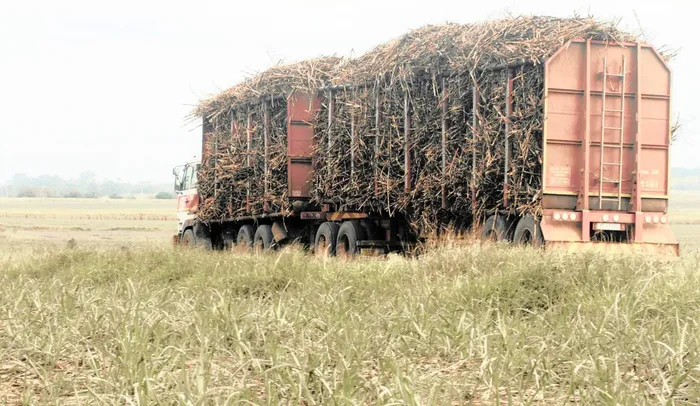The impact of Trump's tariffs on South Africa's sugar industry and jobs

The South African sugar industry is facing the threat of collapsing and job losses as a result of US President Donald Trump imposing 30% tariffs on the country's exports.
Image: Karen Sandison / Independent Newspapers
Stress is weighing on farmers as they anticipate losing millions of rand through 30% tariffs, which US President Donald Trump imposed on South African companies generating profit from exporting to the United States of America.
Despite President Cyril Ramaphosa’s ongoing efforts to talk to Trump to go easy on the local exporters, the fear was that the US would not back down.
The US tariffs against many countries around the world came into full swing after midnight on Friday, leaving a chilling fear that this might collapse the South African industries.
SA Farmers Development Association (SAFDA) Executive Chairman Dr Siyabonga Madlala is concerned that while businesses have no power over politically influenced tariffs, they are the ones that will bear the brunt.
Although it was still early to see how much damage the tariffs would inflict on the local businesses, Madlala anticipated a loss of millions of rand, a situation that would result in alarming job losses.
His concern was that the sugar industry, which falls under the South African Sugar Association (SASA), was producing far more than enough for local and foreign producers, and with the tariffs, a lot might go to waste.
“America, through AGOA (African Growth and Opportunity Act), has given us a lucrative market for some 24,000 tons of sugar exports, so with the imposition of tariffs, our sugar won’t be attractive to our US consumers as it is now becoming expensive.
“It forces US consumers to look for alternatives rather than buying from us because our sugar becomes 30% more expensive,” said Madlala.
South African competitors in supplying the US with sugar are Mexico, Brazil, Australia, and several Central American and Caribbean nations.
Madlala said that while the local sugar industry produces 1.5 million tons for local consumers, another 500,000 tons are sent to the foreign market, which is also supplied by its local producers and other countries.
He estimated that, through the tariffs, SASA loses R168 million from its annual revenue.
He said the sugar market, through the government, will have to find an alternative market for the 24,000 tons that would not be viable to send to the US.
According to Madlala, the US market, which found South African sugar affordable under the AGOA agreement, may look for alternative countries to buy from.
“The reason is that lots of other countries are subsidised, therefore they can afford to sell sugar than us, as we are not subsidised but working on our own.
“With this imposition of tariffs, we will lose 24,000 tons, which will have to go to the dumping market, meaning that we are losing half of the profit we are receiving from the sale of the sugar,” said Madlala.
He said reducing production would cause job losses and the closure of sugar mills.
“Once you try to lower the production, it means some farms will shut down or diversify. By that, it means that sugar mills will lose sugar cane supply, which is the lifeblood of the sugar mill,” he said.
He said the tariffs came at the wrong time when most of the sugar mills were being revived through the Trade and Industry’s master plan and when some sugar mills, including Tongaat Hulett, were making their way out of business rescue.
“Those mills are starved for sugar cane, so we cannot lower production; in fact, we need to grow production. Unfortunately, Trump’s tariff is coming at a time when the industry is being revived. While we are appreciating the initiative of the master plan, we are now bombarded with the tariffs,” said Madlala.
Influential organisations such as FW De Klerk Foundation recently called for the country to expand its trade partners rather than relying on the US. Agriculture Minister John Steenhuisen said the government was also reaching out to other countries.
However, Madlala said finding an alternative market was not easy to do overnight.
National Association of Automotive Component and Allied Manufacturers (NAACAM) Chief Executive Officer Renai Moothilal told the media that the automotive industry was already feeling the effects of the tariffs, as some US companies that contract with the local industry were starting to fall away.
“We are already seeing new contracts, especially for the US, being cancelled or not pursued, putting one of the country’s most critical manufacturing sectors at risk,” Moothilal said.
Build One SA (BOSA) described the tariffs as “a serious escalation in trade tensions between SA and the US”, which are threatening thousands of jobs in automotive manufacturing, agriculture, and mining.
In a statement, the party called on Ramaphosa to be frank with the US political leadership in trying to revive the AGOA agreement.
“Engage directly with the US Congress, where AGOA’s future will ultimately be decided. The case must be made for the mutual benefits of continued trade cooperation and use the over 500,000 US jobs linked to trade with South Africa as leverage,” read BOSA’s statement.
bongani.hans@inl.co.za
Related Topics: